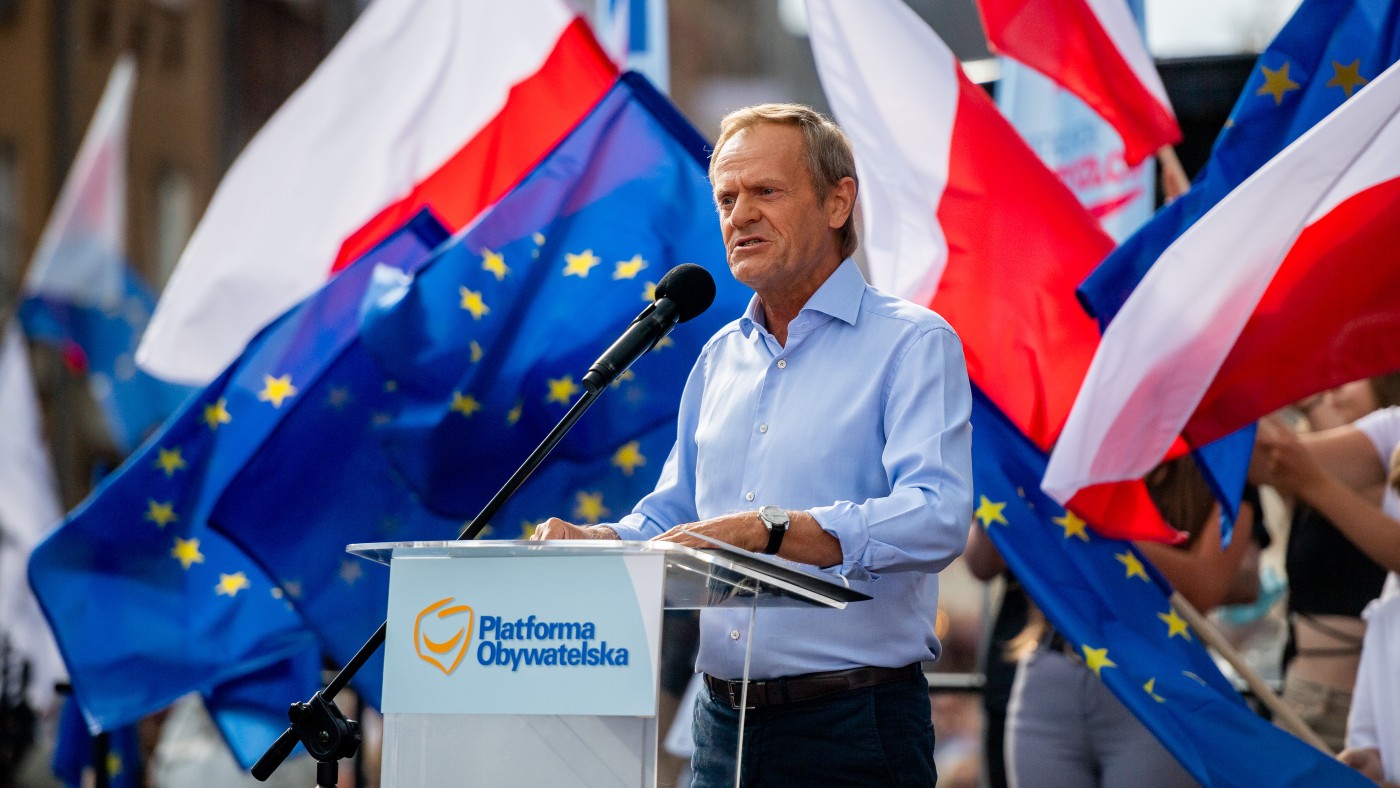Poles apart: the EU and Poland tensions threatening to boil over
Rows with bloc over migration and the rule of law may determine outcome of upcoming Polish election

A free daily email with the biggest news stories of the day – and the best features from TheWeek.com
You are now subscribed
Your newsletter sign-up was successful
Poland’s increasingly fractious relationship with the EU is dominating the county’s political debate as voters prepare to head to the polls.
The nationalist and populist ruling party, Law and Justice (PiS), has long been “intent on stoking an anti-EU and anti-German climate”, said The Guardian’s diplomatic editor Patrick Wintour. “Denouncing the EU as a culturally alien project”, PiS chair Jarosław Kaczyński said last year that it was “the sacred duty” of Polish politicians to oppose the bloc.
Clashes with the EU over the rule of law and migration have become increasingly fraught as the clock now ticks down until Poland’s general election in October. The government wants to hold a referendum on the same day asking whether voters support accepting “thousands of illegal immigrants from the Middle East and Africa” as part of an EU relocation plan.
The Week
Escape your echo chamber. Get the facts behind the news, plus analysis from multiple perspectives.

Sign up for The Week's Free Newsletters
From our morning news briefing to a weekly Good News Newsletter, get the best of The Week delivered directly to your inbox.
From our morning news briefing to a weekly Good News Newsletter, get the best of The Week delivered directly to your inbox.
What went wrong between Poland and the EU?
The “quest for more equitable relations” between Poland and its closest EU neighbours, particularly Germany, has been a “key part of the Polish political agenda” since the PiS came to power in 2015, said Rafał Wós at Spiked.
After becoming a member of the bloc in 2004, Poland was “more than happy to collaborate” with Germany in a bid to achieve greater post-Soviet stability and higher living standards. But as Poland’s economy has continued to rise and Germany’s has stalled, Warsaw has searched for “a more equal and sustainable footing” with one of the EU’s leading powers.
Although gaining EU membership at first meant “accepting an inbuilt bias in rule-making towards the old-timers”, said Anna Gromada in The Guardian, resentment has grown as Germany “uses its EU muscle” to try to “impede” Poland, which has become an “obvious competitive threat”.
Why are tensions increasing?
A “temporary truce between Warsaw and Brussels” was struck as Europe rallied together in support of Ukraine following the Russian invasion last year, said Warsaw-based correspondent Andrew Higgins in The New York Times (NYT). The war “curbed the bloc’s criticism” of Poland, which has played a key role in equipping the Ukrainian military and in the movement of Ukrainian migrants.
A free daily email with the biggest news stories of the day – and the best features from TheWeek.com
But the truce has been transcended by “increasingly venomous domestic political battles” in the run-up to the election, Higgins continued. The Polish government “lashed out angrily” in June at a European Court of Justice “rebuke” over what was ruled to be “illegal efforts to curtail the independence of the Polish judiciary”.
The ruling triggered mass protests in Warsaw against the government and resulted in billions of euros of EU funding being frozen. Poland’s justice minister, Zbigniew Ziobro, responded by denouncing the court as “corrupt” and rejected its verdict.
As the PiS struggles to secure a third term in office, the party has “banked on the migration issue” to win over voters, said Aleks Szczerbiak, professor of politics at the University of Sussex, in a blog for the London School of Economics (LSE). The “vast majority” of Poles strongly oppose EU plans to share out responsibility for migrants entering Europe without authorisation.
Although Poland currently “hosts more than a million Ukrainian refugees”, said the Associated Press (AP), the PiS has “long made clear” that it considers migrants from “different cultures” to be a “threat to the nation’s cultural identity and security”.
And proposals to put the issue to voters in a referendum on election day highlights how the party is “seeking to use migration in its election campaign, a tactic that helped it take power in 2015”.
What next?
The incumbent government’s biggest challenger is former European Council president Donald Tusk, who served as Poland’s prime minister from 2007 to 2014. Tusk leads the pro-business and pro-EU Civic Platform party, which the PiS is attempting to characterise as “a threat to the interests of Poles”, according to AP.
The referendum question is set to ask whether Poland should be part of the shared scheme “imposed by the European bureaucracy”.
Opposition politicians have argued that the referendum question is “pointless” given that the EU scheme is “not mandatory”. They claim “that the aim of the referendum is, in fact, to boost the PiS vote on election day”, reported Notes from Poland.
Szymon Hołownia, leader of the centrist Poland 2050, has called on the country’s electoral commission to introduce measures to ensure the referendum “does not compromise the results of the parliamentary elections”, the site said.
In “a closely-fought election”, said Szczerbiak on the LSE blog, the migration issue could be “crucial to determining the outcome”.
Richard Windsor is a freelance writer for The Week Digital. He began his journalism career writing about politics and sport while studying at the University of Southampton. He then worked across various football publications before specialising in cycling for almost nine years, covering major races including the Tour de France and interviewing some of the sport’s top riders. He led Cycling Weekly’s digital platforms as editor for seven of those years, helping to transform the publication into the UK’s largest cycling website. He now works as a freelance writer, editor and consultant.